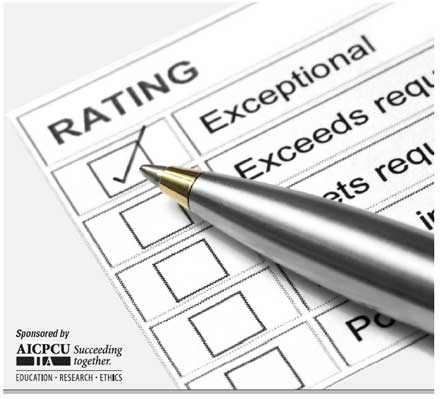 Quality assessments, employee evaluations,reviews—whatever you choose to call the process ofevaluating employee performance—are necessary forachieving goals and obtaining desired outcomes in any business ororganization.
Quality assessments, employee evaluations,reviews—whatever you choose to call the process ofevaluating employee performance—are necessary forachieving goals and obtaining desired outcomes in any business ororganization.
If you cringe at the thought of these mandated reviews, thenit's time to adjust your mindset and realize their value.Performance assessments are not just a time to alert employees totheir faults and reiterate what you expect from them. Assessmentsprovide a built-in, formal structure for telling employees wherethey stand within the company while creating plans to foster theirfuture successes. Additionally, this time serves as an opportunityfor managers and employees to align goals, develop strategies forincreasing productivity, and address underlying issues. Viewassessments as an opportunity to improve your team's production andincrease motivation, not just as a required step in reporting toyour own superiors.
|Without performance reviews, employees lack the guidancenecessary to know where they stand within the company and have nobasis for understanding how their contributions impact the companyas a whole. The performance evaluation process should helpemployees see how their jobs and expected contributions fit withinthe bigger picture of the organization. Managers are able to sharethe overall objectives of the company and outline how individualtasks roll up into the company-wide initiatives.
|Additionally, employee performance reviews are an ideal time totake stock of the talent on your team. Are certain employeesstanding out from all the others? Use the performance assessment asan opportunity to recognize top performers' contributions andreward them with added responsibility. Focus on how theirdetermination can trickle down throughout your entire team.
||Benefits of Performance Reviews
|Use performance reviews to communicate objectives, strategies,and tactics to your team. This is the time to get everyone on thesame page regarding what is expected of them. Employees need toknow if their work levels are adequate or if there are areas whereimprovement is necessary to meet quality requirements.
|Carl Van, president and CEO of the International InsuranceInstitute, Inc., and an expert in the claim industry, advises thatclaim professionals, by nature, are accustomed to making decisionsand backing up those decisions with documentation or facts. Whenthey receive negative reviews or low quality scores, they seekspecific information to show them where the problem exists. It isVan's experience that when employees consistently receive poorreviews, they do not understand what is being asked ofthem—even if their managers feel it has beenthoroughly explained. He suggests providing an example of how thetask could have been done differently to achieve betterresults.
|If you are also creating goals for the coming year during yourreview, ask employees to come to the meeting prepared with a fewpersonal performance goals. Encouraging employees to take ownershipfor their goals will increase their performance and enhance theirdesire to reach those deliverables. Keep in mind that the mostmotivating goals are ones that are difficult, yet attainable. Ifnecessary, set mini-tasks or check-up points that relate to alarger, overarching achievement. This management-by-objectivesstyle will increase employees' dedication to projects.
|Quality Assessment
|In the claim arena, performance evaluations are based on anumber of factors that usually include timelines, thoroughinvestigations, and customer service. Many areas of claim handlingare subjective, and various methods could ultimately achieve thesame outcome. On the other hand, some areas of claim handling dealwith more concrete issues such as damages, estimates, andcoverages. Overall, the claim department is working to increaseproductivity, decrease costs in association with loss adjustmentexpenses (LAE), and improve customer service.
|With the knowledge that claim handling is the number one factorin customer retention for insurance companies, there is anever-increasing pressure to evaluate and improve claim-handlingprocedures. This starts with the adjuster or the claim handler. Theperformance evaluation of the claim handler, as explained above,should increase communication, establish expectations, reinforcegood work performance, point out unsatisfactory performance, andoffer guidance about how to improve.
||All that being said, it's unrealistic to have perfectevaluations of everyone. All of your employees are never going tobe working at the same, high-performance level. Be honest whenevaluating underperformers, but also demonstrate your commitment tohelping them succeed. Use the performance assessment to focus onthe root of a problem and work with them to develop potentialsolutions. Do employees have the tools and resources necessary tosucceed? Do they thoroughly understand the tasks assigned to them?Show employees that you are dedicated to their success, yet remainfirm when describing the expected quality and quantity of theiroutput.
|
Claim handling is a balancing act of people/customer serviceskills, subject knowledge (such as property/casualty, workers'comp, and so forth), and technical abilities. The most successfulclaim handlers will provide value in all three of these categories.However, there will always be areas where some employees excel overothers. In the performance assessment, it is important to reinforcethe strengths of each employee and build upon those strengths,while pointing out the weak areas and providing constructiveadvice.
|David G. Javitch, Ph.D., is an organizational psychologist,consultant, and internationally recognized author. He offers thisadvice: Before the interview is complete, make sure that both youand the employee know specifically and measurably what went well inthe past year and what did not. Ensure that you agree on concreteplans to maintain and increase positive performance, whileminimizing or eradicating negative performance. Both of you need toagree on future behavioral goals to achieve success, along withbenchmarks throughout the coming year to measureaccomplishments.
|Performance reviews don't have to be daunting tasks. Think ofthem as a formal time to reflect on the past year and focus onboosting performance and accomplishments in the year to come. Whilesome employees may be performing below standard, use your criticismconstructively to support their success and ultimately increase theoverall productivity of your team.
Want to continue reading?
Become a Free PropertyCasualty360 Digital Reader
Your access to unlimited PropertyCasualty360 content isn’t changing.
Once you are an ALM digital member, you’ll receive:
- All PropertyCasualty360.com news coverage, best practices, and in-depth analysis.
- Educational webcasts, resources from industry leaders, and informative newsletters.
- Other award-winning websites including BenefitsPRO.com and ThinkAdvisor.com.
Already have an account? Sign In
© 2024 ALM Global, LLC, All Rights Reserved. Request academic re-use from www.copyright.com. All other uses, submit a request to [email protected]. For more information visit Asset & Logo Licensing.








